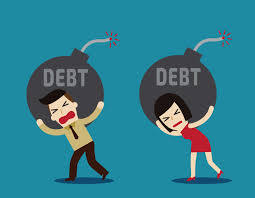Earlier this week the Federal Reserve Bank of New York issued a report about personal debt and there were several trends that are concerning. First and foremost, household debt rose to a record level in the fourth quarter of 2018. The total household debt came in at $13.5 trillion—yes that is trillion with a “T.” The fact that it hit a record isn’t a bad sign all by itself since the economy is growing and consumer spending has a lot to do with economic growth. In fact, consumer spending accounts for two-thirds of the economic growth in the United States.
The disturbing trends come from other areas. One such area is the fact that the overall household debt hit a record while mortgage debt fell for the first time in two years. We know the housing market has been slipping in the last few quarters, so it makes sense for mortgage to slide a little. But to have overall debt hitting a record while mortgage debt falls—that is a major concern.
The areas where personal debt grew were in the form of credit cards and auto loans. Credit card debt jumped to $870 billion, and that matches the level prior to the financial crisis in 2008.
Auto loan stats showed that over seven million car loans were past due by 90 days or more. That is a new record and it is well above the previous peak of 5.7 million in 2011.
Meanwhile, credit inquiries fell in the second half of 2018 and that is a sign of slowing demand for credit. The level of credit inquiries hit the lowest level ever recorded by the New York Fed.
Still another sign that the demand for credit is falling came from the number of credit cards being closed. The closure rate jumped to its highest level since 2010. Like the auto loan market, credit card delinquency jumped as well. The flow of credit card accounts in serious delinquency rose to 5% from 4.8% in the third quarter.
When you add all of these stats up, we are looking at several potential bad signs for the economy. Consumers are spending on cars and other items, but not housing. They are also having a hard time keeping up with their payments and this is when the economy was growing at its fastest rate in a number of years. What’s going to happen when the economy slows?
I remember very clearly doing an interview on Bloomberg Television back in 2007. I was in the studio in West Palm Beach, waiting for my segment to go live. I was listening to the conversation that was going on live at the time. The two guests were discussing the tightening credit market and how they thought it wouldn’t hurt the overall economy, but rather it would be confined to the financial sector that was hurt.
This was at the very beginning of the credit market getting locked up. When it was my turn to go on live, I wasn’t asked about the credit market and what I thought. It was the Friday before Labor Day and I immediately started working on my next article.
How could these analysts think that the tightening credit market wouldn’t have an impact on the overall economy? We are a debtor nation. From the government down to the consumer—we spend more than we take in, period.
With little to no savings and a tightening credit market, how was the economy going to continue to grow? Where was the money going to come from to increase spending? Those were the questions I was asking in 2007.
Now I am asking, how are delinquencies rising in most areas while the economy has been growing and while the unemployment rate is the lowest it has been in decades? What is going to happen when the economy starts contracting and the unemployment rate goes up?
This is a scenario where I see the financial sector getting hit harder than other sectors, but if the banks are having to write off a greater number of loans, they are also going to have less money to lend to quality borrowers. If the demand for credit is falling and delinquencies are rising, does that mean that the quality of borrower is falling as a whole?
The global economy is already showing many signs of slowing—China, Germany, the EU. Personally, I don’t think the U.S. economy is strong enough to stand on its own and not weaken if the rest of the world enters into a recession.
The level of household debt and tPosthe level of government debt could be the next big crisis that jolts financial markets like the housing and debt crises did in 2007-2008.


Recent Comments